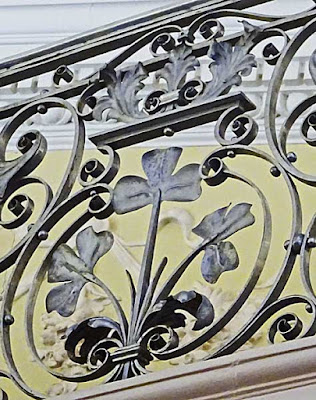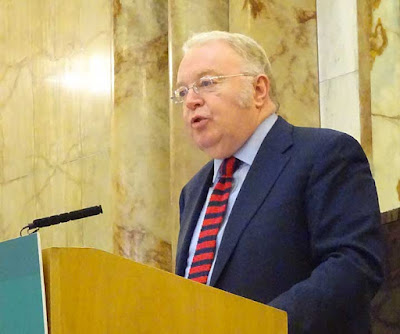Tuesday, March 29, 2016
ALTRUISTIC EVIL?
The question is posed. Was the 1916 Rising a Glorious Thing or an Altruistic Evil?
Certainly this talk had to be a glorious thing or the speaker was a goner.
He was challenging the very basis of the Rising in the middle of its centenary commemoration. He was doing it in Iveagh House, headquarters of the Department of Foreign Affairs, in the heart of the current administration, so to speak. And the whole thing was being run by the national broadcasting station, RTÉ.
The Secretary General of the Department of Foreign Affairs, Niall Burgess, introduced the event. He took the opportunity to give us a potted history of this magnificent building mentioning some of the historic meetings and talks which had taken place there.
I had attended many meetings there myself in my day but, fortunately perhaps, none of these got a mention.
Niall explained that the ballroom in which we were sitting had been specially built for an expected visit by the Prince of Wales and he drew our attention to the Prince's three feathers above the shamrocks on the ironwork on the balcony.
Unfortunately the Prince didn't turn up. A bit like Napoleon in Bruges, or more prosaically, Hopalong Cassidy in Butlins.
And so over to Felix. The talk had been billed as discussing the democratic and moral credentials of the Easter Rising, issues which the independent Irish state has tended to ignore in its official commemorations and celebrations of 1916 – and which even historians have been reluctant to address.
Felix launched straight into an introduction to the term "altruistic evil" a term introduced by Jonathan Sacks, the former British chief rabbi, by which he means evil committed in a sacred cause, in the name of high ideals.
The ground had to some extent been covered in 1966 by Frs Martin and Shaw when they discussed the moral justification for the rising.
You can get the gist of Fr. Martin's criticism in a piece Felix wrote in the Irish Times in January, and the talk ran along these lines and more.
It is worth mentioning that Fr Shaw's very detailed criticism of Pearse in particular was deemed inappropriate for publication in the Jesuit magazine Studies in that anniversary year and did not appear until 1972.
But in this, the centenary year, Felix held his ground and held it well. He relenlessly pursued the logic to its ultimate conclusion, disposing of the retrospective validation of the Rising by the 1918 election along the way.
Clearly Felix's view of the Rising was indeed that it was an "altruistic evil".
Then it was into a fairly lively Q&A guided by the host, Ingrid Miley from RTÉ.
One questioner raised the very fundamental issue of whether it was appropriate for historians to take a moral stance, and his question was given a round of applause which showed that some of the audience thought he had a point. In reply, however, Felix argued that when one is asked to commemorate or celebrate a historical event, you have to ask whether one approves of it or not. I don't have any problems with historians taking a moral stance as long as their history is good and the stance is their own and seen to be so.
I'm afraid I got a bit carried away myself and made three comments in one intervention. I said I was tickled how Felix managed to drag the Red Indians into a talk on 1916. I also suggested that if we were to commemorate anybody it should have been the British military command who turned the Rising into a relative success. And finally I noted that despite extensive quoting of Pearse's poems there had been virtually no mention of his beautiful poem "Fornocht do chonac thú", which I had learned in school and which set out his apartness and blood sacrifice very succinctly. This I felt reflected the status of the Irish language today and would have been a disappointment to Pearse.
Overall the balance in this session was hostile to Felix's thesis but he weathered the storm and I expect that the thesis will gain more traction as historians continue to probe the real history of the period.
Labels:
1916,
altruistic evil,
Felix Larkin,
Rising
Subscribe to:
Post Comments (Atom)






No comments:
Post a Comment
Bona fide comments only. Spamming, Trolling, or commercial advertising will not be accepted.